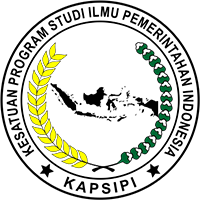Quo Vadis MPR RI
Antara Eksistensi dan Legalitas Produk?
DOI:
https://doi.org/10.35967/jipn.v14i2.6176Keywords:
constitutional-legal-sociological, quo vadis, TAP MPRAbstract
The existence of the institution as People's Consultative Assembly [MPR] in the Indonesian legal and political system reform era has lost its real existence. This is due to the Assembly in the era Old Order and New Order is a tool for the rule to justify the truth in defense of the regime. While in the reforms era that have transformed the politics of law [the law of political reform], the Assembly as a whole are voters product democratic institutions 'half aspirational', representative democracy areas that can not directly create and produce regulations [legislation]. Based on the background mentioned, this paper aims to [i] Explaining the position of the Assembly as an institution of the state in the Indonesian legal and political system; [ii] Explains MPR decrees in the hierarchy [structure] of the Indonesian Legal Politics. Based on the rationale of this paper conclude two things. First, as an institution 'half aspirational', MPR has a function and authority as 'judge consent of the governed' in determining [the good, bad and fail or succeed] the implementation of the rule of law in the future. Second, because being 'judge consent of the governed', then the laws the MPR in the hierarchy of law if the Constitution as Constitutional-philosophical, the Decision [TAP] MPR can be Constitutional-Legal-Sociological Considering as a basis for policy making [ragulation] related matters a special thing for the benefit of the people.
Downloads
References
Abdul Hamid Saleh Atamimi, UUD 1945-TAP MPR-Undang-Undan, dalam Padmo
Wahjono. 1984. Masalah Ketatanegaraan (himpunan tulisan). Jakarta: Ghalia Indonesia.
Adi Sulistiyono. 2007. Negara Hukum: Kekuasaan, Konsep dan Paradigma Moral. Surakarta: Universitas sebelas maret press.
Denny Indrayana. 2007. Amandemen UUD 1945 Antara Mitos dan Pembongkaran. Bandung: Mizan.
Jimly Asshidiqie. 2004. Format Kelembagaan Negara dan Pegeseran Kekuasaan dalam UUD 1945. Jokjakarta: FH UII Press.
Jimly Asshiddiqie. 2006. Hukum Tata Negara dan Pilar-Pilar Demokrasi (Serpihan Pemikiran Hukum, Media dan HAM). Jakarta: Konstitusi Press.
Fukuyama, F. 2005. Memperkuat Negara Tata Pemerintahan dan Tata Dunia Abad 21. Terj. A. Zaim Rofiqi. Jakarta: Preedom institute dan Gramedia pustaka utama.
Hanta Yuda AR. 2010. Presidensialisme Setengah Hati Dari Dilema ke Kompromi. Jakarta: Gramedia Pustaka Utama.
Hendarmin Ranadireksa. 2009. Arsitektur Konstitusi Demokratik Mengapa Ada Negara Yang Gagal Melaksanakan Demokrasi. Bandung: Fokusmedia.
Maria Farida Indrati Soeprapto. 2011. Ilmu Perundang-Undangan-Jenis,Fungsi dan Materi Muatan. Jokjakarta: Kanisius.
Maria Farida Indarti Soeprapto. 2007. Proses Pembuatan Produk Hukum di Indonesia. Jakarta: Fokus Media.
Mohd. Mahfud MD. 2006. Membangun Politik Hukum-Menegakan Konstitusi. Jakarta: LP3ES.
Undang – Undang Dasar Republik Indonesia.
Undang-Undang Dasar Republik Indonesia (Naskah perubahan/amandemen).
Ketetapan MPR tahun 1960–2002.
Ketetapan MPR No.I/MPR/2003.
Undang-undang No.10 Tahun 2004
Undang-Undang No.12 tahun 2011 tentang, “Pembentukan Peraturan Perundang-Undangan.”
Downloads
Published
How to Cite
Issue
Section
License
Copyright (c) 2015 Author(s)

This work is licensed under a Creative Commons Attribution-NonCommercial-ShareAlike 4.0 International License.





